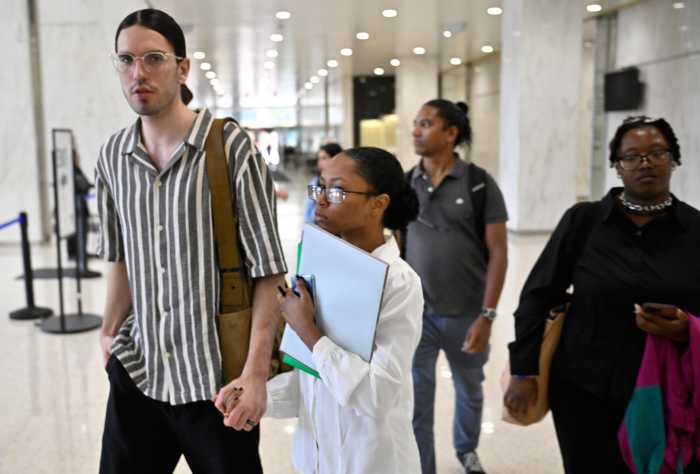District judge finds birth mother’s wife presumptive parent
BY ARTHUR S. LEONARD | Finding that the Iowa Supreme Court’s 2009 marriage equality mandate extends to all aspects of state law, a Polk County district judge in Des Moines has ruled that the lesbian spouse of a birth mother was entitled to be listed as one of the parents on the birth certificate, with no need to adopt the child.
Judge Eliza J. Ovrom, on January 4, ordered the Iowa Department of Public Health to issue a birth certificate naming Melissa Gartner as a parent of Mackenzie Jean Gartner, a child conceived through artificial insemination and born to Heather Gartner, Melissa’s wife.
The couple, who have been in a relationship since 2003, held a commitment ceremony in 2006, according to Ovrom’s opinion. When Heather had a son in 2007, also conceived through artificial insemination, Melissa adopted him through a second-parent proceeding.
The couple married in June 2009, shortly after the Iowa Supreme Court’s marriage equality decision, and Heather gave birth to the couple’s daughter three months later. The two mothers filed a birth certificate listing themselves as Mackenzie’s parents, but the Department of Public Health issued a certificate listing only Heather, leaving blank the other parent space on the form and informing Melissa she would have to adopt Mackenzie if she wanted to be listed on the girl’s birth certificate. Represented by Lambda Legal, Melissa sued the Department.
The state’s position contradicts the well-established presumption that a child born to a married woman is also the child of her legal spouse. Melissa is the stay-at-home parent while Heather is out working to support the family, and lacking a birth certificate listing her as a mother is a disadvantage in ways spelled out by Ovrom. Though Melissa could adopt Mackenzie with Heather’s consent, that would be a costly and time-consuming procedure and a judge would scrutinize Melissa’s suitability as an adoptive parent.
The state pointed to a statute directing the health department to place the “husband’s” name on a child’s birth certificate, unless “paternity” has been established otherwise. Any parent other than the birth mother’s husband cannot be listed except through a judicial adoption proceeding. The state argued that the court should defer to the department’s interpretation of that statute.
The Gartners argued that given the 2009 marriage equality ruling, the health department must apply a gender-neutral construction to the birth certificate law. Agreeing with them, Ovrom wrote that the marriage decision “states that language in the Code of Iowa will have to be interpreted and applied to carry out the legality of same-sex marriage.” The high court, the judge noted, specifically mandated that, beyond striking down state law limiting civil marriage to different-sex couples, “the remaining statutory language must be interpreted and applied in a manner allowing gay and lesbian people full access to the institution of civil marriage.”
Ovrom also pointed out that the State Supreme Court “cited legitimacy of children born to married parents… as one of the benefits that was withheld from same-sex couples who could not legally be married. This is a strong indication that the Supreme Court intended married same-sex couples to have legal recognition that their children are legitimate and entitled to the support of both parents. The Department’s refusal to place Melissa’s name on the birth certificate frustrates” that intention.
The judge rejected the state’s argument that the customary presumption that a child born during the marriage is the legal child of both parties to the marriage is founded solely on the belief that the birth mother’s husband is the child’s genetic father. She noted that the same presumption has been applied in Iowa when the mother’s husband was “away at war and could not possibly have fathered the wife’s child.”
Ovrom noted as well that Mackenzie was conceived by artificial insemination using an anonymous sperm donor, so “The Department’s stated goal of naming the biological father of the child cannot be met.” Mindful that this would not be true in every case of a lesbian mother’s wife, the judge wrote, “The court’s holding is limited to the facts of this case.”
Those concluding comments are unfortunate, since they suggest that where there is a known sperm donor the court might have reached a different conclusion, although all of its analysis leading up to that point in the opinion would support a broader holding. Presumably, where there is an agreement by which a known donor contracts to waive any parental rights, this should not be a problem. If the state seeks to appeal this ruling, it would be helpful for a binding appellate ruling to clarify this issue.
This birth certificate issue likely has its roots in the politics surrounding same-sex marriage in Iowa. A year after the high court ruling, Terry Branstad, a Republican hostile to same-sex marriage, was elected governor, a development that could have persuaded the Department of Public Health to dig in on the position it took. With Republicans in control of one house of the Legislature and just two votes down in the other, there is a sense that the GOP is engaged in a holding action regarding the institutionalization of the 2009 ruling.
Ovrom’s decision is a courageous position for an Iowa judge to take in light of the electoral blowback that, in 2010, unseated the three Supreme Court justices — sitting on a unanimous pro-marriage equality bench — who faced their retention referenda that year.
































